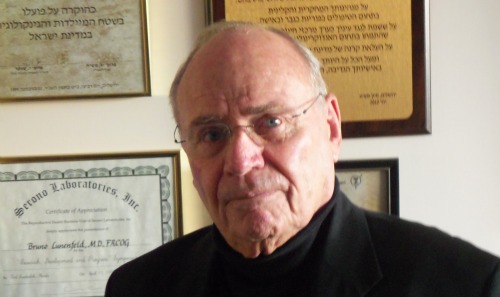Israeli fertility trailblazer Dr. Bruno Lunenfeld looks back on 50 years of achievement ahead of an international conference on gonadotropins.

Approximately one out every 10 couples experiences difficulty conceiving. But until the middle of the last century, many of the causes of infertility were not fully understood, and there was little that could be done for women unable to become pregnant.
A major turning point occurred during the 1950s, when a team of researchers, including Israeli physician Bruno Lunenfeld, unraveled the workings of gonadotropins, the hormones that enable ovulation to take place.
Their research led to the development of a human gonadotropin drug, Pergonal, which Lunenfeld used in 1961 to treat an Israeli patient unable to ovulate. The treatment was a success, and she became the first woman in the world with an infertility problem of this kind to conceive.
The 50th anniversary of this clinical breakthrough in the field of fertility will be celebrated at the 10th International Symposium on GnRH (human gonadotropins), February 6-8 in Salzburg, Austria, which is being co-chaired by Lunenfeld.
‘Test-tube” babies
Lunenfeld’s innovation paved the way for the use of human gonadotropins in the treatment of other kinds of infertility problems, including therapies facilitating in vitro fertilization (“test-tube babies”). Pergonal helped produce the world’s first test-tube baby, Louise Brown, in 1978.
Looking back at this milestone in medical history, Lunenfeld, now 84, muses about how medical research has changed in the last 50 years.
“When we published our first paper [describing how female gonadotropins stimulate ovulation] in 1954, we believed in a different kind of medical ethic. We wanted our discovery to belong to the whole world, so we published it in a scientific journal in order to prevent commercial companies from being able to patent it and monopolize its use,” says Lunenfeld, who founded the department of life sciences at Bar-Ilan University in 1969 and today is a professor emeritus of reproductive endocrinology.
He has continued to generate revolutionary research in the fields of fertility and aging, working at Bar-Ilan as well as at the Weizmann Institute of Science and Sheba Medical Center, and as acting chief scientist for the Ministry of Health from 1984 to 1986.
Nuns provided the right stuff
He is especially proud of how he enabled Israeli women to be among the first in the world to benefit from emerging fertility treatment technologies.
Israeli women enjoyed free access for a number of years to Pergonal, thanks to the alliance Lunenfeld forged with Dr. Piero Donini, R&D director at Serono , the European pharmaceuticals firm that produced the drug.
“The main problem that drug companies faced was finding a source of massive amounts of gonadotropins,” recalls Lunenfeld, noting that he had obtained the small amounts that he needed for his experiments by extracting the hormones from the urine of post-menopausal female volunteers.
“It takes about a day’s supply of urine from 10 women in order to produce a single therapeutic dose,” says Lunenfeld, adding that in those days there were no genetic engineering methods available for production.
Luckily, explains Lunenfeld, Serono had a unique connection to an important authority with access to a huge supply of post-menopausal urine.
“It turned out that the Vatican owned a majority of the shares in the Serono company. So, with a direct request from the Pope’s nephew, Don Giulio Pacelli, who was a member of the Serono board of directors, it was easy to get the cooperation of nuns living in old-age homes throughout Italy.”
Though Serono managed to solve the problem of collecting thousands of liters of urine, the expertise of Lunenfeld and his research team at Sheba was still needed to solve many of the purification and other R&D issues related to both the production process and its clinical use. In gratitude for Lunenfeld’s contributions, Serono agreed to supply Israeli women with Pergonal.
Inspired by wedding words
When Lunenfeld is asked how he became interested in fertility research, he tells an anecdote that in many ways reflects why he and many other Israeli scientists have helped Israel become a superpower in this field. The story dates back to his wedding, which took place while he was studying medicine in Geneva during the years following World War II.
“The rabbi, Rav [Y.E.] Botchko, who came to officiate at the ceremony, made a special request,” recalls Lunenfeld, noting that the rabbi had headed the only yeshiva in Switzerland to operate during the Holocaust. “‘Having lost so many of our brethren, it’s up to young scientists like you to help us regain our strength,’ he said to me.”
It’s likely that the rabbi’s words resonated with Lunenfeld because of his own history. Born in Vienna, he was 11 years old when the Nazis began to deport the city’s Jews — including his father — to concentration camps. His mother arranged for him to be part of a group of Jewish children permitted passage to England. It turned out to be the last Jewish group to escape safely.
Lunenfeld immigrated to Israel in 1940. He has devoted his career to fulfilling the dream envisioned at his wedding ceremony more than 60 years ago. Israel’s preeminence in the field of fertility, evidenced by the country’s 25 fertility centers and the highest proportion of fertility treatments per population in the world, owes a great deal to his personal contribution.












